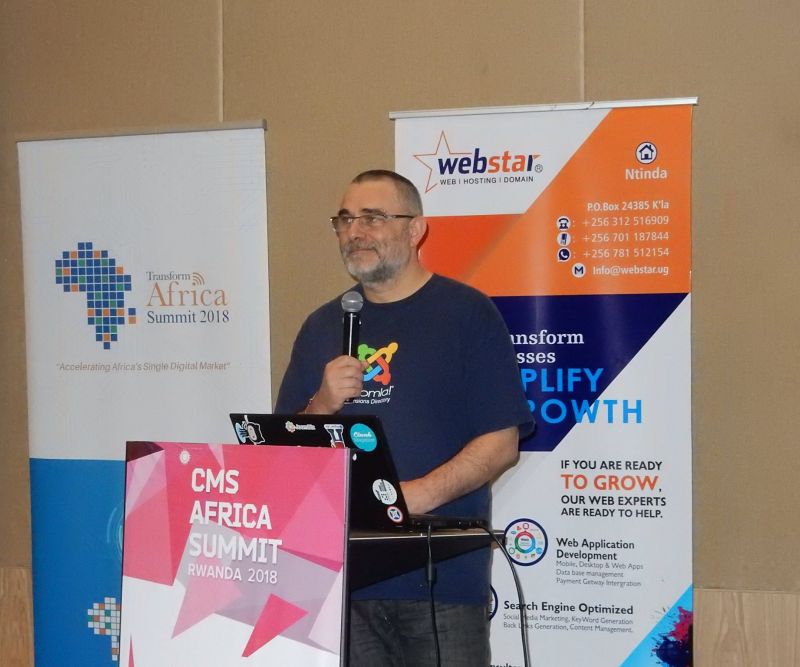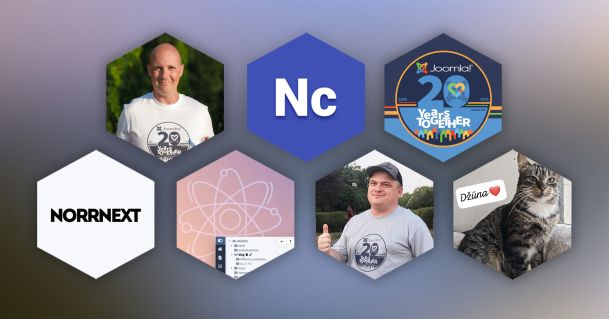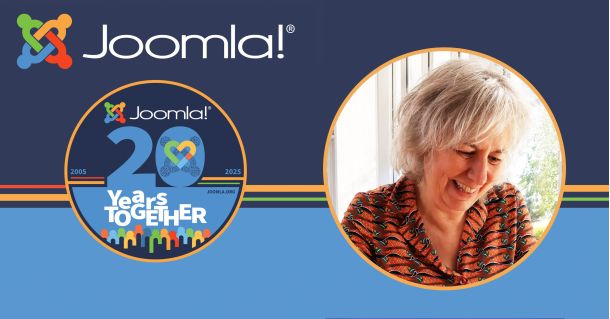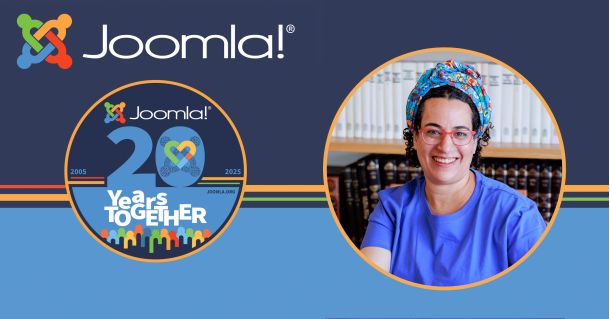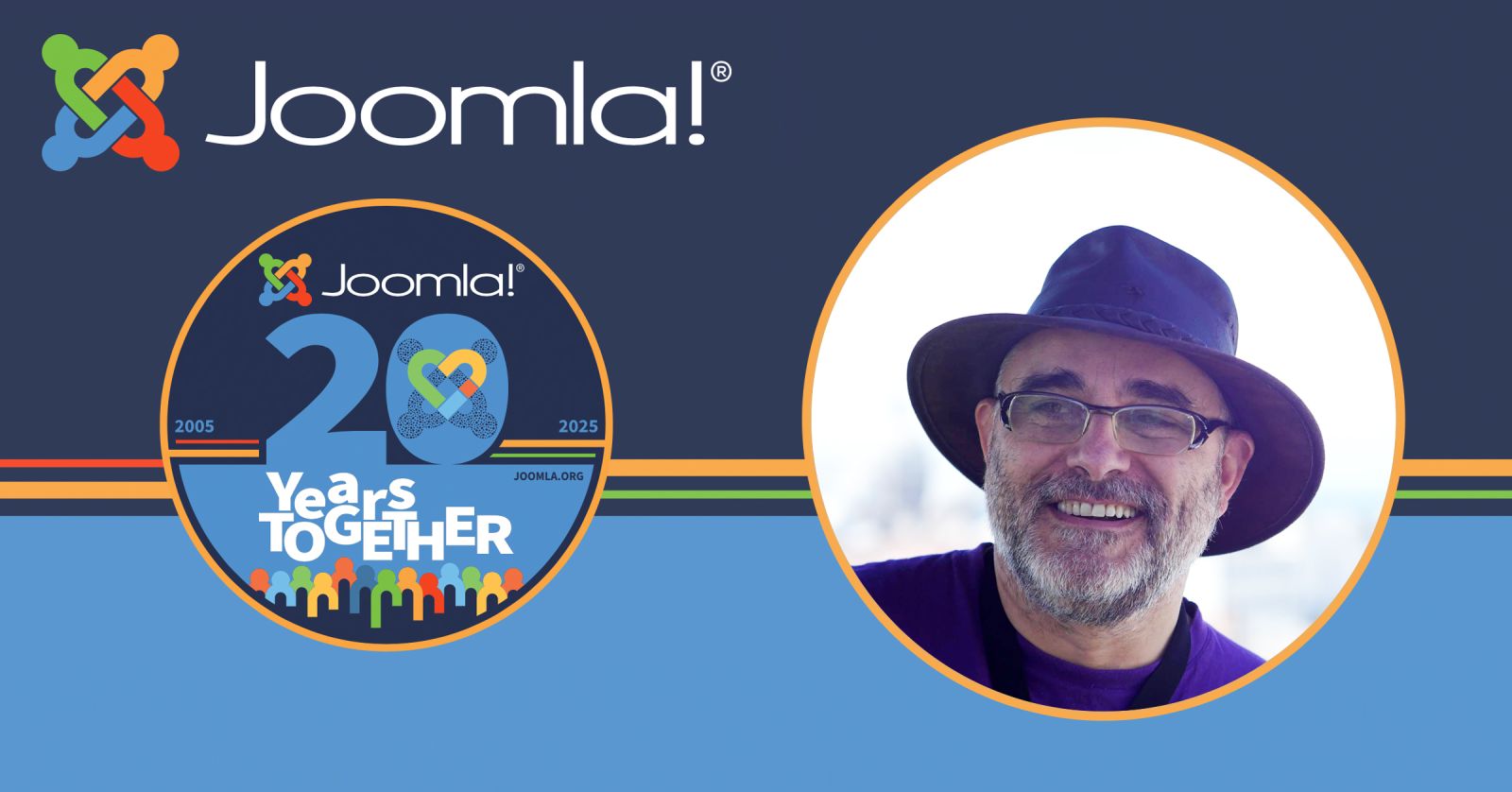
Joomla in Faces. Daniel Dubois (former Joomla Vice President)
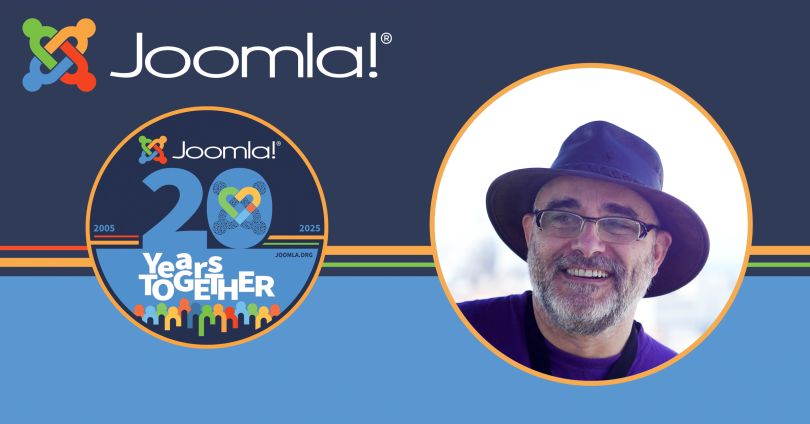
- Published: 12 November 2025
- Last modified: 07 January 2026


We are pleased to welcome Daniel Dubois, a former Vice President of Joomla and a true evangelist from France. As the founder of web-eau.net, he has created hundreds of websites and is a prolific contributor, having written countless articles and tutorials, shared overrides, and released free extensions. He is also a seasoned JoomlaDay speaker and the founder of TemplateJoomla and the Joomla Jobs Portal.
1. Could you tell the audience a bit about yourself?
Hi everyone, and thank you NorrNext for the invitation to participate in this nice series.
I’m Daniel, a French Joomla evangelist, founder of a web agency web-eau.net created in 2012. After years of requesting help from the community, I’ve decided to give back in 2014 by volunteering for Joomla.
Since, I've created hundreds of websites, written hundreds of articles about Joomla, hundreds of tutorials, shared hundreds of overrides, and released tens of free extensions.
I mainly work with medium and large organizations, and collaborate with a team of reliable partners (dev, design, integration, etc).
I live with my wife and our cat in a little peaceful town in Bretagne, not far from the sea.
2. How did your first encounter with Joomla happen?
It's an encounter based on hazard.
In 2007, I wanted to create a website to present... my dog (with absolutely zero knowledge and skills). It was mostly for intellectual curiosity, to keep learning something new.
A friend of mine had just created a web portal with Joomla 1.5, so I've decided to test it too.
I don't deny, my first steps were... hazardous but quickly, I've understood that something much interesting was hidden in Joomla. I've kept on practicing in the evenings, and week-end, just as a hobby for years.
3. What motivates you to contribute to Joomla, and what do you gain from this involvement?
In 2014, I was asking help from the Joomla Extensions Directory team about one of my first extensions. Tessa Mero replied that I could wait or join the team, to get the help more quickly. I've applied, and worked for the JED for... 6 years.
Contributing to Joomla is just obvious to me. I received so much help since 2007, that I couldn't stay without giving back, without also sharing all the knowledge I've learnt since 2007.
Also since I've created my web agency, and make money with Joomla, helping and contributing is also essential and necessary. I don't believe this will repay everything Joomla has given me, but I'm doing my best.
Since I contributed to Joomla, I’ve met so many people, and made lots of friends (even in Russia). This is just priceless.
4. How would you describe the French Joomla Community in a few words?
To be very honest, I have a complex relationship with the French Joomla association. And I’m not the only one. I contributed to it for years, and I'm glad to see there's still 30.000 French Joomla sites alive. Sadly, I'm not very optimistic about the future of this association, without a real rejuvenation, and change in matters of diversity, and inclusivity. Being open is a real strength, and a real opportunity for creativity, and future.
I consider Joomla as a no-borders, or no-limits ecosystem. So, I have some difficulties with clans, or with bordered minds. Furthermore, French people usually have a problem with foreign languages, this does not facilitate communication and relationships with "J.org". It must be admitted that this led to a certain isolation.
But, France has been a valuable asset for Joomla for 20 years: volunteers, board members, developers, speakers, sponsors, etc. Even if some local decisions have been dommageable, the French community is still engaged in the Joomla project.
5. You are often a speaker at various Joomla events. Which ones were the most memorable for you?

Over the years, I've understood that the audience comes primarily for the content of my presentations, not to judge my outfit or my level of English.
Daniel
Honestly, whether in French or English, they were all impressive because I have stage fright when speaking in public.
Over the years, I've understood that the audience comes primarily for the content of my presentations, not to judge my outfit or my level of English. This has helped me feel more comfortable and also to prepare better.
Attending a Joomla conference (national or international) to present a project, showcase a completed website, or share an experience or an idea is an unforgettable experience that I recommend to everyone.
I will always remember the incredible reception from the audience in Kigali, Rwanda, at CMS Africa 2018, and the passionate questions when I presented the Joomla Jobs Portal at the last JoomlaDagen in Utrecht.
6. What are your impressions of being the Vice President of Joomla? How was that experience?
To be perfectly honest, I don't have fond memories of it.
Firstly, because I wasn't prepared to join that particular team. Working with an international team, having very regular online meetings—it's all very demanding, and you have to be aware of that before committing.
But the worst was yet to come. The president at the time had enormous problems, and it had terrible consequences. In just a few months, the entire team fell apart, without me being able to implement the projects I wanted for Joomla.
Finally, the end of this experience was difficult on a personal level. But I quickly realized that a position on the Board wasn't the be-all and end-all, and that it was entirely possible to help Joomla in other ways.
Five years later, looking back, I'm glad I had this experience on the Joomla Board of Directors. If you want to help Joomla, get involved!
7. How would you evaluate the current success of the templatejoomla.com project? Is it popular?
Templatejoomla.com is a project dear to my heart, and I'm proud to have created it because it helps and serves many Joomla users worldwide. However, I believe that success can be measured in different ways.
The overwhelmingly positive feedback from the public is the success that means the most to me. I'm always amazed to receive these messages, compliments, and praise, but it motivates me to continue working with even greater standards.
Beyond traffic, it's the affiliate commissions paid to Joomla that truly measure this success. Every year, approximately €300 are donated directly to OSM to support Joomla. This is possible thanks to the people who use the site and purchase templates for their Joomla websites.
And speaking of the site's popularity, I want to sincerely thank our Russian friends, who are among the site's most important users.
8. Regarding the Joomla Jobs portal — is it time to introduce this project?
The Joomla Jobs Portal is another project that began with a simple idea. Starting with an initial override, I tried to design and build a fully functional job posting site without installing any extensions (except for Akeeba Backup). Another intellectual challenge!
While working on this project, I realized that Joomla didn't have this type of useful site (WordPress and Drupal do). So, I decided to donate the site to Joomla once it was finished.
I designed all the site's features so that others could use it—both the frontend and the backend—as easily as possible.
In just a few weeks, the site was almost complete. I took advantage of JoomlaDagen in the Netherlands to present it to the public and announce to the community that it would be donated to Joomla. This was done a few days ago.
This project demonstrates that it's entirely possible to help Joomla by doing things "differently". This site can be used to recruit volunteers, to help the ecosystem find human resources, but also as a showcase to demonstrate the power of our favorite CMS.
9. Could you tell us about other projects you are involved in?
I have two client projects to deliver before the end of this year, so business is my priority for now.
I don't have any Joomla projects underway at the moment, but if a site like the Joomla Jobs Portal proves useful for Joomla and its ecosystem, then I might consider continuing to explore this way of contributing.
A CMS like Joomla is extremely powerful and allows you to create truly comprehensive websites. And in many cases, it's often possible to do without third-party extensions.
But while saying this is good, I believe it's even more important to demonstrate it to the public. A few years ago, I launched the Joomla Overrides Challenge with Viviana Menzel to show the public how to use overrides to increase efficiency.
And it is on this type of project like the Joomla Jobs Portal that I would like to continue working, both to highlight the work of the production team, and to show the public the full power of Joomla.
10. How do you find a balance between work and volunteering?
Since COVID-19, I've noticed a surge in my activity, and as a result, I've had to prioritize my work hours to maintain a stable balance between my personal life, my professional life, and my commitment to Joomla.
Since I could no longer contribute several hours a week to Joomla like many others do, I had to rethink my schedule to accommodate everyone: my wife, my clients, and Joomla.
The very nature of a company or project like Joomla is its ability to adapt to changes in its environment. When you have a surge in activity, you need to focus on that. When a security vulnerability is discovered, it becomes a priority for the Joomla teams.
To successfully balance my business, my personal life, and supporting Joomla, I've chosen to concentrate all my volunteer time into a shorter period.
In 2021, I created TemplateJoomla in three months to build the website and add several hundred templates. This year, I took advantage of a slightly quieter period of a few weeks to create the Joomla Jobs Portal.
Regardless of when or how, the most important thing for me is to continue contributing to and supporting Joomla.
11. What advice would you give to those who want to start volunteering but are still unsure?

Looking back on my volunteer experience, I wish I had gotten involved sooner, but at the time, I didn't know it was possible to contribute.
Daniel
Looking back on my volunteer experience, I wish I had gotten involved sooner, but at the time, I didn't know it was possible to contribute.
Contributing to an open-source project like Joomla is first and foremost about committing to giving. You commit to giving some of your time, some of your energy, some of your skills to help this project. Without being paid. So you have to be ready and willing to participate selflessly.
Joomla is also, and above all, a community. Contributing is an act of love for this community. You'll meet amazing people from all over the world who come together around a common project and work together for the benefit of all. And this community will become like a second family. And that's priceless.
Come in, we're waiting for you!
12. Joomla is turning 20. What are your thoughts on this milestone?
Ahhh, I've thought a lot about this fundamental question over the past few years. In fact, here's what I published on the subject in 2020 when I was Vice President:
Joomla now has all the necessary features to create a modern website. In this respect, we're on par with our friends at WordPress and Drupal, so the difference won't be there.
The first question to ask is: what new users do we want to attract? Is Joomla a consumer-grade CMS like WordPress, or is it aimed at a more professional audience?
The main challenge is that Joomla doesn't have a large marketing budget to organize huge, global advertising campaigns. So we need to think differently, out of the box.
It's complicated; I don't claim to have all the answers, but I think there are still some avenues for improvement.
External communication
Today, the Magazine is doing a remarkable job with internal communication. We need to communicate in the same way externally, using media related to the web, web design, code, security, SEO, etc., because currently, Joomla is simply invisible, and therefore doesn't exist for the users we should be attracting.
But let's be clear, I'm not talking about producing tons of slop with AI, but about creating real content—texts, videos, etc.—in multiple languages by real humans. This would represent an enormous but essential undertaking. Yes, a lot of effort is needed here…
Developing the user base
We can no longer rely solely on the native features of our CMS to attract new users; we absolutely must adopt a proactive and effective approach.
I provided an initial answer during a presentation at JoomlaDay UK in 2017 (22:45 min.video).
This type of project, aimed at the general public, has the advantage of being scalable worldwide, relying on a local network of JUGs (which also need rebuilding).
The Joomla Jobs Portal
This type of site can also help attract new users to Joomla. By contacting schools, universities, web agencies, and extension developers to invite them to post their job openings and CVs, we offer them significant visibility.
13. What key advantages of Joomla would you highlight?
Oh no, how to choose? There are so many…
What really makes the difference for me is precisely its native functionalities. Where other CMSs require dozens of additional plugins, with all the risks that entails, Joomla doesn't need any because everything is built-in. Even multilingual support.
This simplifies creation, facilitates management, and reduces website maintenance. For a web agency, a freelancer, and for end clients, these are simply huge advantages.
14. In your opinion, how should the Joomla project be developed to succeed in today’s environment and challenges?

To maintain and develop a large-scale, open-source project like Joomla, we can no longer rely solely on volunteers.
Daniel
My answer might shock many people, but I stand by it.
To maintain and develop a large-scale, open-source project like Joomla, we can no longer rely solely on volunteers. These men and women have availability and skill constraints, and their motivation is waning.
This system was viable 20 years ago, but due to a lack of generational renewal, it becomes increasingly complicated to get motivated volunteers to get the job done efficiently. We can't hide anymore behind "volunteers are doing their best". This is undoubtedly true, but it is no longer enough.
Therefore, to succeed in today's environment, I believe OSM should raise funds to recruit a professional team—that is, people whose training and profession it is, to manage the entire operational aspect of a project: production, marketing, etc., while respecting our values.
I am aware of what this would mean for many people, and that's why I know—unfortunately—it will never happen.
But I truly believe that this is what needs to be done.
15. Joomla is turning 20 this year. What are your thoughts on this milestone?
Twenty years is very young (when you're three times that age), but it's also an eternity on the web. Honestly, it’s just amazing! Many predicted Joomla's demise, and they were all wrong. Many swear by WordPress, and they all panic as soon as a plugin is infected.
Regardless, Joomla continues on its path, resilient, modern, accessible, and open source. Without the volunteer community, none of this would exist today (or would have disappeared a long time ago).
I've talked a lot (too much) about myself, but I'm very proud to have been one of these volunteers since 2014, and I can't thank Joomla enough for everything it has given me.
Twenty years should also be a perfect opportunity to have a big celebration "all together." So, when's the next JWC?

